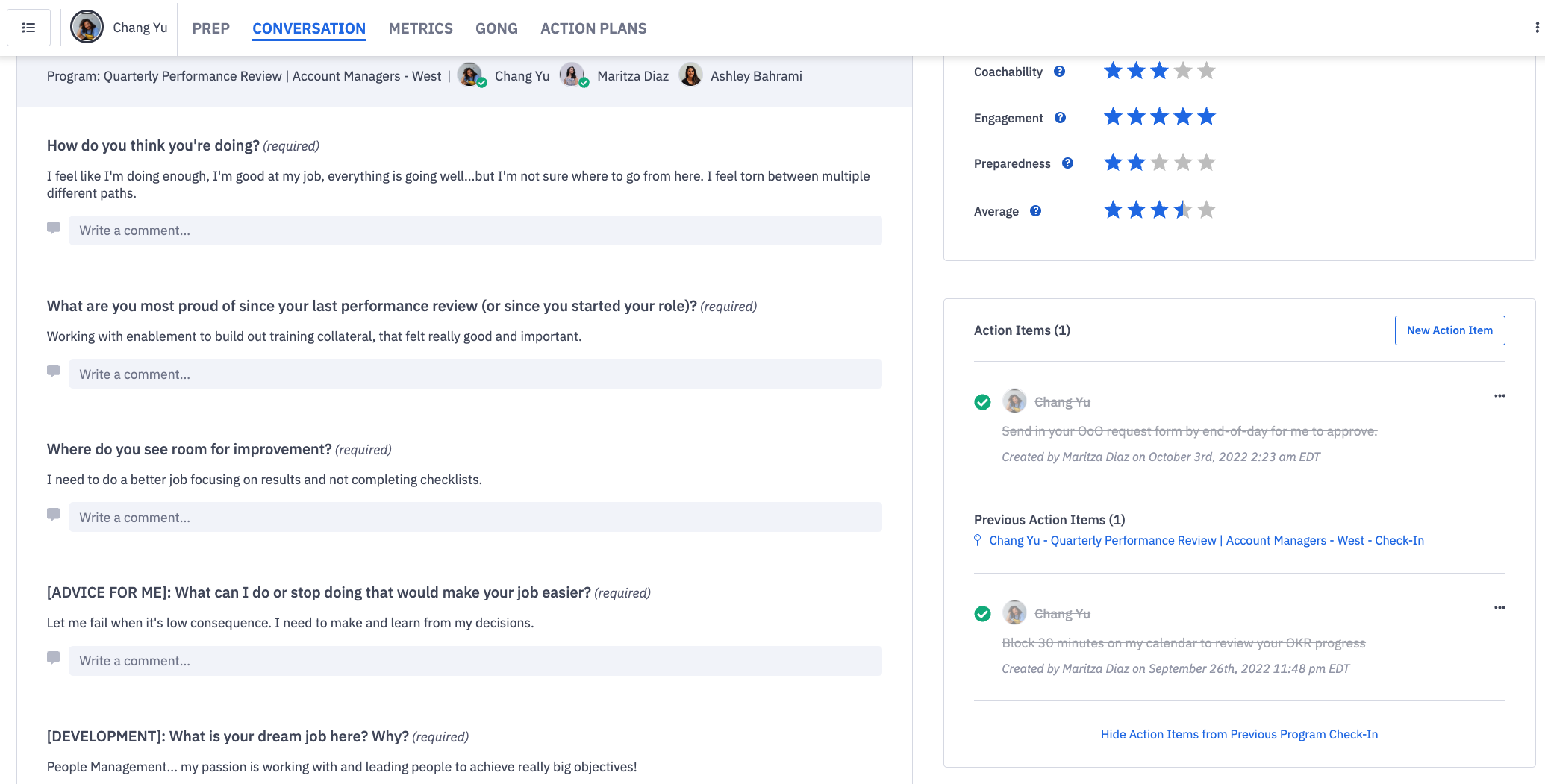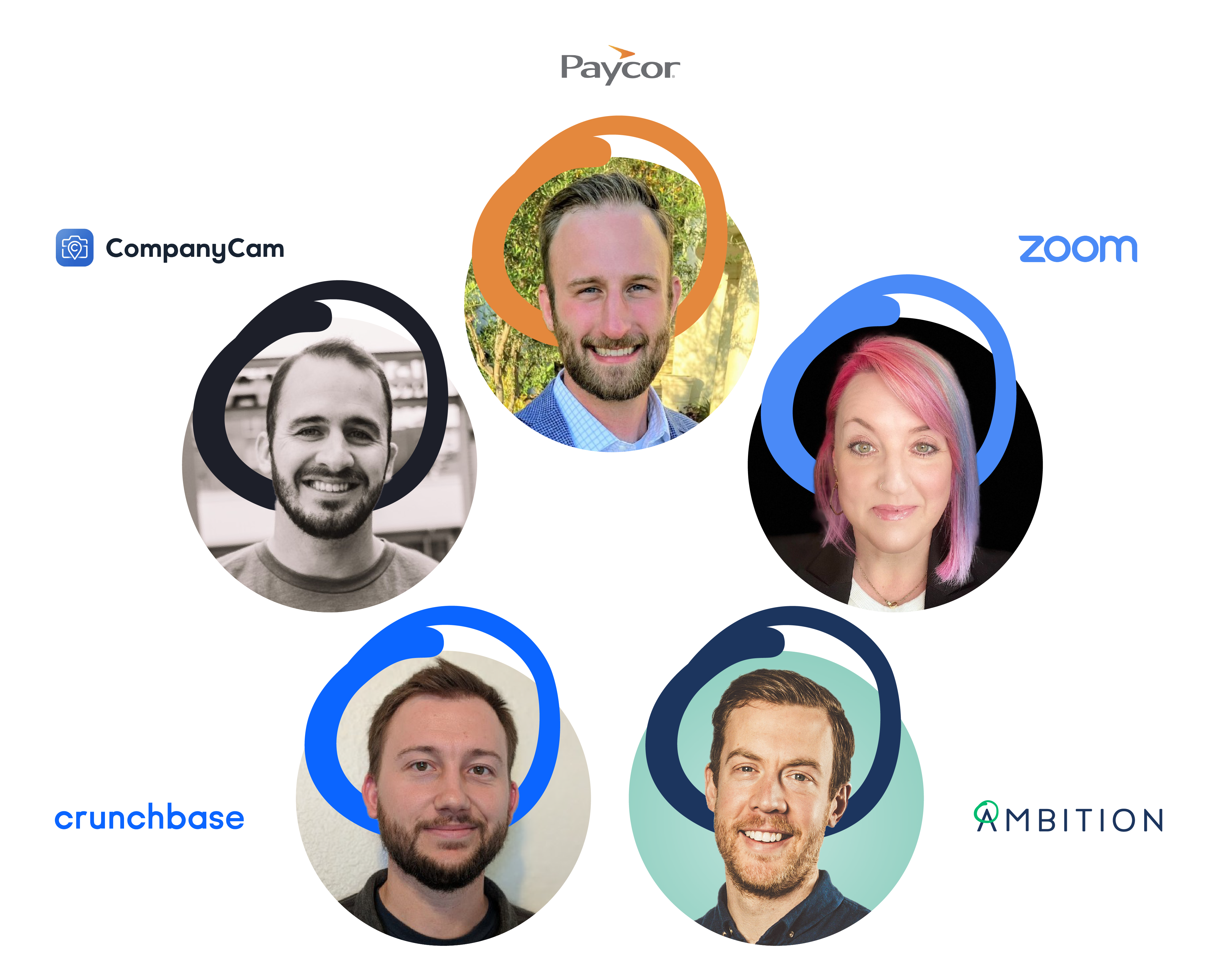Why an Investment in Sales Coaching is Critical for Future Success
2023 is almost here, and let’s be honest—many sales organizations are struggling. They’ve been asked to do more with less, or more with what they already have. They can’t rely on the promise of increased budget or headcount. According to research from Forrester, organizations that plan to grow headcount in 2023 will invest in product, marketing, and customer experience departments before they invest in sales. This leaves us asking the question, “What investments can we make that will increase our personal and employee value in 2023?”
I recently hosted a roundtable webinar with some of today’s most forward-thinking revenue leaders from Zoom, Paycor, Crunchbase, and CompanyCam to talk about how they’re strategically preparing for 2023 with this challenge in mind. A common thread through it all: every leader has their eye on coaching. In this blog, I break down 10 elements that every strong coaching program should have in the new year, how organizations typically fall short, and how you can implement these sales coaching techniques to make every coaching session more effective.
What is a coaching session?
A coaching session in sales is a meeting between manager and rep to discuss challenges, rep performance, short and long term goals, and how to achieve those goals. This dedicated time is the manager’s opportunity to strategically pour into rep development, which is a major driving force behind rep retention. In a time when we’re asked to do more with less, coaching the people we already have is the best way to future-proof our revenue organizations.
Download my free coaching template here to use during your next 1:1 coaching session.
10 Tactics to Make Every Coaching Session More Effective
1. Make it measurable
The problem with many sales organizations is they don’t have a consistent, scalable, and measurable sales coaching process. Executive leadership lacks insight into who is coaching, how often they coach, and how effective the program is. If you want to retain top performers and realize greater revenue potential, you need to implement a measurable coaching solution that can answer the following questions:
- Is my coaching strategy working?
- How are my managers performing?
- Which teams/managers are performing well? What are they doing right? How can we scale and repeat that process?
- What trends are we seeing?

2. Build trust and accountability
One-on-one coaching sessions are a time for managers to develop a sense of trust and accountability with their reps. Building this human connection is just as important as helping reps set goals, work on specific skills, and strategize. When reps feel a sense of trust with their managers, they are more likely to come prepared and engage in honest, candid conversations about how they’re doing, what they need from you, and where they need to improve.
You should follow up on agenda items and action plans from previous touchpoints every week, but not everything has to be work related. Take a 360-degree approach and focus on coaching the whole person. Did a rep mention something fun or exciting they had planned for the weekend? Ask them about it. Were they nervous about a specific call or demo? Ask them why and how it went. When you learn what makes each individual rep tick, you have the power to help them reach their peak potential at work and in life.
“For us as managers, it’s really easy to just be focused on reps producing. But if we’re not stopping to celebrate them authentically, they’re going to feel disconnected and not seen, especially in a remote environment.”
– Will Reyes, SDR Manager, Crunchbase
3. Let reps lead the conversation
Coaching is a two-way street. Empower your reps to take part in the conversation by bringing their specific questions, calls, and challenges to each coaching session. This will encourage them to think critically about their own performance since your last touchpoint, how (or if) they completed the previous week’s action items, and how they can improve. Great sales coaches should guide the conversation and let their reps lead it. When you give reps this responsibility and opportunity, they begin to take ownership of their own development, become more receptive to feedback, and develop greater trust with you.

4. Authentically celebrate wins
We typically think about coaching in the context of, “What do we need to work on? Where can we improve?” But it’s also important to highlight what your people are already doing well. In addition to automating recognition globally within your team via Slack or Microsoft Teams workflows, make sure you recognize big and small victories during one-on-one coaching sessions. Call them out.
It’s easy to do this when things are going well, but it’s equally important to authentically show your appreciation when things aren’t going well. We won’t always be able to celebrate a big milestone or recognize an important win. Celebrate the small things whenever you can.
“It’s super easy to celebrate when things are going well. It’s very, very difficult to celebrate when things are hard. What people want right now is to feel seen. We have to find ways to connect and celebrate with one another.”
– Sarah Linich, Sales Manager, Zoom
5. Be consistent
Coaching only works if it’s consistent. This doesn’t mean you have to coach every rep in exactly the same way. It means ensuring everyone at your organization has access to and utilizes the same basic framework for coaching. This is important for a few reasons:
- It holds everyone to the same coaching standard
- It ensures cross-functional alignment on your messaging strategy, vision, and high-level goals
- It empowers every manager with the right tools to coach effectively
6. Leverage the knowledge of your whole team
Your people are one of your greatest assets, and everyone has unique strengths. Leverage their power and knowledge for the benefit of the entire team. Invite your reps to participate in team meetings as subject matter experts on a specific topic, hold group coaching sessions, and facilitate peer<>peer coaching sessions in addition to your existing one-on-ones.
Sometimes, reps will learn better from one another than they might in a one-on-one coaching session. Group and peer<>peer coaching present opportunities for your people to reinforce their own skills by teaching others, get ideas and new perspectives on certain challenges or strategies, and practice leadership skills.
“We have Workshop Wednesdays which are designed for reps to be able to hear from each other and learn, how are the winners winning right now? For reps who might be struggling, what are some easy ways to overcome that? Peer-to-peer coaching seems to be the best way to get reps to move forward and take that next step because they’re learning from the people that are winning every single day.”
– Sawyer Ritz, Director of Sales, CompanyCam
7. Democratize access to data
Data tells the truth about rep and revenue performance and removes the guesswork about who needs coaching and in what areas. Democratizing access to performance data with automations gives everyone real-time insights, which means coaching isn’t limited to a one-on-one coaching session. When managers have real-time visibility into what’s going right and what’s not, they can celebrate wins and coach reps in the moment.
Having a single source of truth also encourages reps to hold themselves accountable in between coaching sessions. It’s equally as valuable for them to see what they’re doing well and where they’re falling short. When they can see and recognize these trends in real time, they begin to self coach and take more ownership over their performance.
8. Make it personal
Every rep is different. Rep A and Rep B may not learn in the same way or respond to the same kind of feedback. Ask them how they like to receive feedback, what motivates them, and what they need from you as a manager so you can coach in the ways they will learn best.
9. Come prepared with an agenda
Align on the purpose of your coaching session prior to the meeting with an agenda. This saves valuable time and ensures you spend your one-on-one time in a meaningful way. Before the meeting, ask your reps to identify their best and worst calls from the week for review, submit their questions, and answer any specific questions you have for them. When both parties are aligned before a coaching session begins, you can use every moment of that time more productively.

“We cannot always focus on the large-scale view, especially on a day-to-day, week-to-week, or month-to-month basis. You have to identify the one area where you can make an impact and see the incremental change with that one impact before moving to the next step.”
– Michael Plunkett, Senior Regional Sales Director, Paycor
10. Keep it simple, specific, and actionable
Since you probably only have an hour to spend with each rep every week, you can’t overcomplicate things. Align with each rep on one area of improvement they’d like to focus on during each coaching session. Use your one-on-one time to develop an action plan that will help the rep improve or practice their specific skill throughout the week. This will help you create accountability and measure their progress week over week.
Coaching is one of the most powerful ways you can position your team towards success in the new year and beyond. If you’re curious about how other revenue leaders are thinking ahead for 2023, you can watch my on-demand webinar here.
 Back
Back



